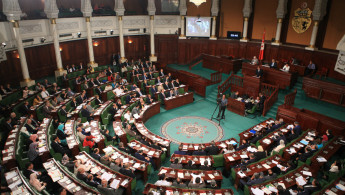Parliament website and remote meeting accounts of MPs blocked in Tunisia
Tunisian deputies discovered on Friday evening that their personal accounts used for remote meetings had been blocked and that the official parliament website had been closed, in what appears to be an attempt to block MPs from resuming their work after the president’s power grab in July.
An MP from the Qalb Tounes (Heart of Tunisia) party, Rafik Amara, told The New Arab’s sister site, Al-Araby Al-Jadeed, that the accounts of all deputies have been closed on the Microsoft Teams platform which was used for remote meetings throughout the coronavirus pandemic.
He confirmed that the parliament’s website was also blocked, suggesting that this came at the orders of President Kais Saied to the assembly’s administration, with the aim of preventing meetings from taking place.
"These restrictions on the work of parliamentarians and attempts to prevent them from carrying out their work during the opening of the parliamentary session will only increase the insistence on fulfilling their duties," Amara stressed, noting that "initiating parliamentary work is a constitutional duty that is binding on all elected representatives who have taken the oath."
The Tunisian legislature adopts a digital system and a remote communication platform which enables sessions and meetings to be held remotely, where minutes are recorded and published on its website and in the country’s official gazette.
Speaker Rached Ghannouchi Friday evening also called for the resumption of parliament, stressing his rejection of the president’s decision to dissolve parliament as completely unconstitutional.
He has repeatedly called on Saied to go back on his decision.
Saied on 25 July suspended the legislature, sacked the government and seized control of the judiciary, later moving to rule by decree. His move was considered a coup mainly by the Islamist-inspired Ennahda party which Ghannouchi belongs to, and the biggest party in parliament.
On Wednesday, Saied appointed geologist Najla Bouden to form a government – the first woman prime minister in the region - which Saied himself will technically head under measures he announced last week.
MPs, who remain stripped of their immunity, salaries and other privileges, unsuccessfully tried entering the parliament building on Friday but were blocked by security forces.





 Follow the Middle East's top stories in English at The New Arab on Google News
Follow the Middle East's top stories in English at The New Arab on Google News
![Israeli forces ordered bombed Gaza's Jabalia, ordering residents to leave [Getty]](/sites/default/files/styles/image_330x185/public/2176418030.jpeg?h=a5f2f23a&itok=_YGZaP1z)

